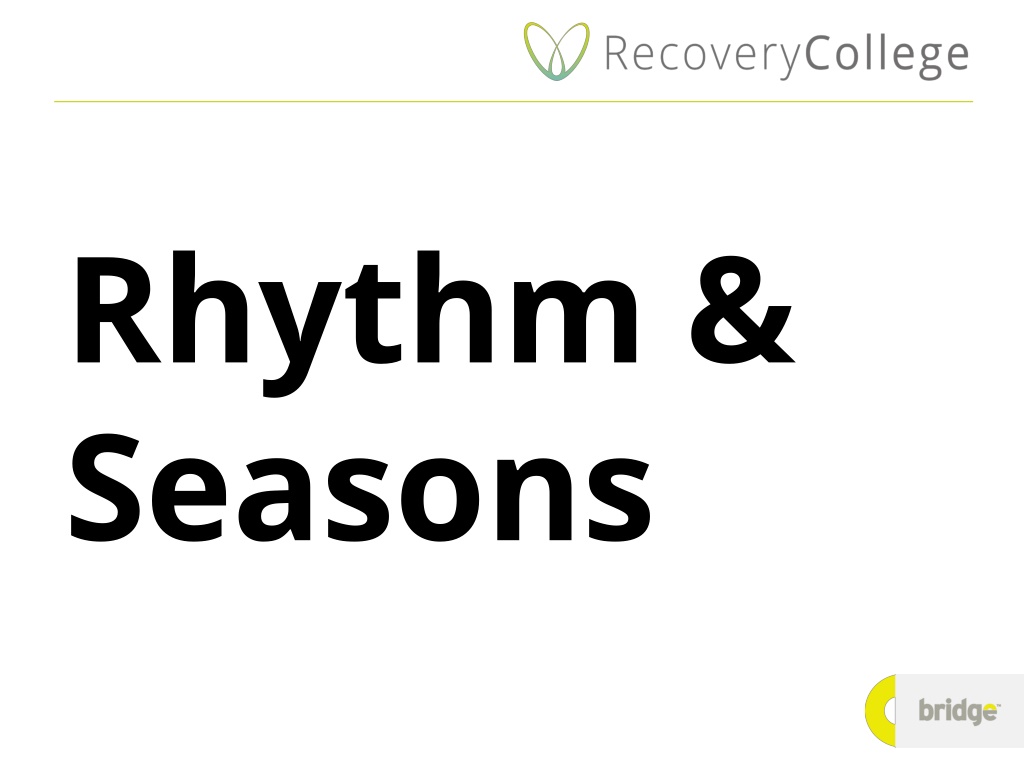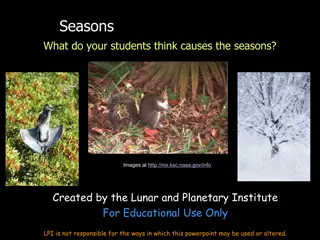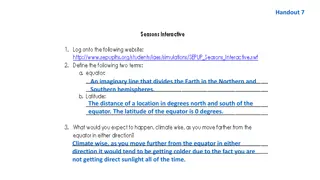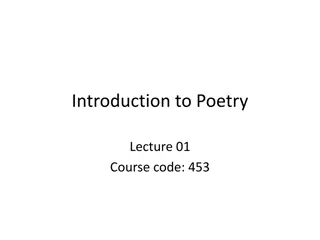Embracing Life's Seasons: Rhythms and Reflections
Life is like the changing seasons, each bringing valuable lessons and opportunities for growth. Embrace the different seasons - Spring for new beginnings, Summer for action, Autumn for transition, and Winter for reflection. Explore the rhythms of life - circadian, infradian, and ultradian - to understand your body's natural cycles. Reflect on how you can align your activities with your internal clock for optimal well-being and productivity.
Uploaded on Sep 07, 2024 | 1 Views
Download Presentation

Please find below an Image/Link to download the presentation.
The content on the website is provided AS IS for your information and personal use only. It may not be sold, licensed, or shared on other websites without obtaining consent from the author.If you encounter any issues during the download, it is possible that the publisher has removed the file from their server.
You are allowed to download the files provided on this website for personal or commercial use, subject to the condition that they are used lawfully. All files are the property of their respective owners.
The content on the website is provided AS IS for your information and personal use only. It may not be sold, licensed, or shared on other websites without obtaining consent from the author.
E N D
Presentation Transcript
Rhythm & Seasons
Background Life is like the seasons. There is a cycle to everything. Each of these seasons of life bring with them valuable lessons that we can use to help us move forward in a better way. Instead of resisting change, we can learn to embrace the different seasons and use them to help us live life in more optimal ways.
Seasons Spring a time for new ideas and insights. It means new beginnings and growth. Remember to declutter. Throw away the old and prepare for the new. Summer a time for action. Cultivate what you have been growing. No more planning or waiting to pursue those dreams and goals. Just do it! Autumn a time for transition and change. Time to slow down and integrate what you have learned. Harvest wisdom Winter a time of personal growth and reflection, a time to go within, a time to replenish energy before the start of the growing season.
Embracing the Seasons Consider the following questions: In your week, can you identify the different seasons? E.g. planning, growth, action, and rest. Where should each season go? Are these balanced, or are you lacking one in particular? For example, do you ever feel you just need a little time to yourself? Do you feel overloaded or overwhelmed?"
Rhythms Circadian rhythm a biological rhythm of about 24 hours with a period from peak to trough of about 24 hours. Example: the sleep-wake cycle among hundreds of others. Infradian rhythms - occur less often than once a day, more at once a month or twice a season. Example, the human female menstrual cycle which occurs every 28 days; birds migrate south for the winter and bears hibernate. Ultradian rhythms - occur more often than once a day, frequently on or about a 90-minute cycle.
In tune with your rhythms Consider the following questions: What is your body clock doing right now? Are you a morning or evening type? What time would you get up if you were entirely free to do so? When are you at your most alert? At what time of day do you feel you become tired as a result of need for sleep? You have decided to engage in hard physical exercise. Bearing in mind, nothing else but your own internal body clock, what time would you choose to do it?
Find a spider, a snail, or another slow creature. Observe it for 30 minutes, then take another half hour afterwards to reflect. What can you learn from it? For one week, set your alarm an hour earlier than usual. On the first day, make a plan for how you can best use the extra six hours that week. Time everything you do in a day. Should you change how much time you spend on things? Think about where you were five years ago. What brought you to where you are today? Try to imagine yourself five years in the future. Where would you like to go? Make a timeline or a mindmap that illustrates this 10- year period. Set a timer for 40 minutes to focus on just one thing. During that time, try to stay on task; don t get up, make a call or have a coffee. Make a commitment this month to take an afternoon, an evening or a full day to bask in the presence of a loved one. Sit alone in a room for an hour, without any distraction or activities. No sleeping. Reflect on what happens with you and your thoughts. What kind of things pop into your mind when you re alone? What activities do you miss? Make a to-do list for each day of the coming week, ranking all the items from high priority to low priority. Work down your list, from high to low. Embrace the weather. Get excited about the different weather changes.























